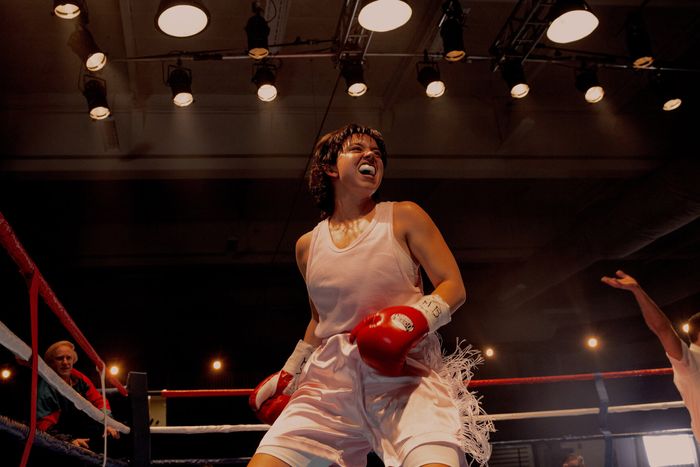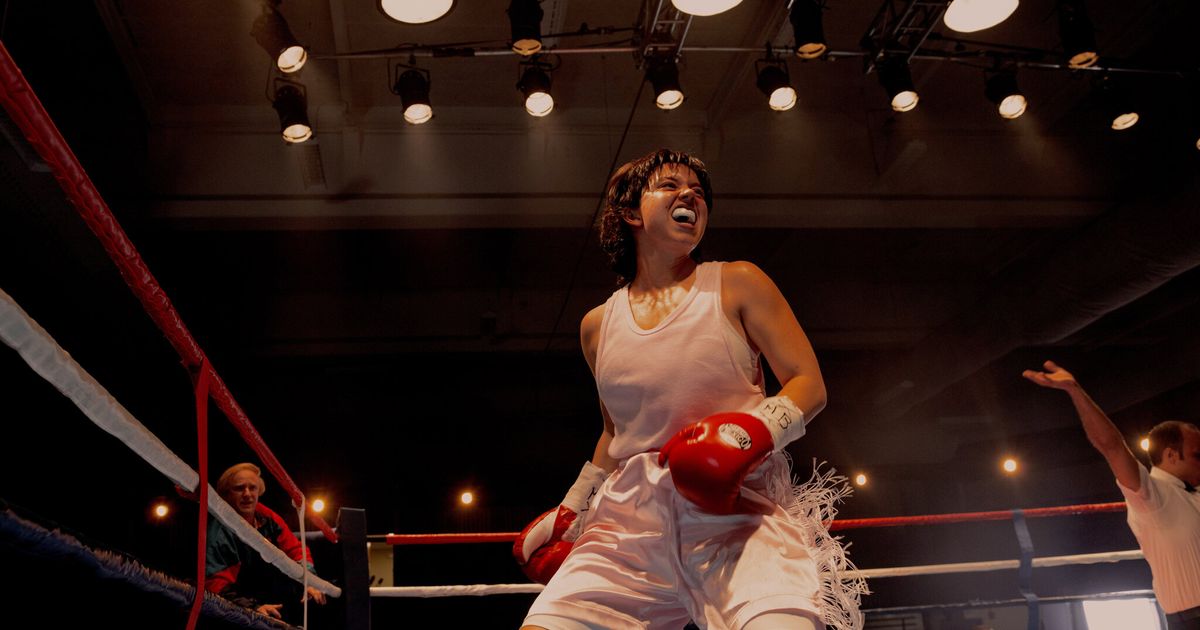
Photo: Eddy Chen/Black Bear
Sydney Sweeney put on a reported 30 pounds of muscle to play boxer Christy Martin, the subject of Christy, turning her body from red-carpet willowy to one with a sturdy solidity. The movie begins in 1989, when Martin was just out of her teens and fighting in Toughwoman contests, and spans 22 years, providing all sorts of opportunities for ungainly period hairstyles, from a ragged pageboy to a curly mullet to a frizzy shag. Sweeney also goes mostly makeup-free for the role — the most striking thing she wears on her face is the blood that famously streamed from Martin’s nose during her bout with Deirdre Gogarty in 1996, an event credited with launching women’s boxing into the mainstream. In starring in Christy, in other words, Sweeney is participating in two of the grand traditions of actors wanting to demonstrate their seriousness and also potentially win an award. She’s transformed her body, like Robert De Niro in Raging Bull and Jared Leto in Dallas Buyers Club, and she’s dramatically deglamorized herself, like Charlize Theron in Monster and Jennifer Aniston in Cake.
But Christy, which was directed by Animal Kingdom’s David Michôd from a script he wrote with his partner, Mirrah Foulkes, isn’t rote Oscar bait, and Sweeney isn’t doing the sort of studied showboating that so often comes with the territory. For reasons not entirely or even mostly of her own doing, Sweeney has become an exasperating celebrity — not above baiting the press, but so painstakingly media trained that her public appearances are devoid of substance and any sense of personality. As a public figure, she is a blank space onto which increasingly unhinged discourse has been projected. As an actor, though, she can be spikily fascinating, from her approach to Christy and the excellent 2023 film Reality, to the way she launched a production company in 2020 to assemble her own projects. Christy roughly hews to the rise-fall-redemption formula of so many biopics, but it’s not the straightforward inspirational sports story it looks like. It’s at least as much about an abusive relationship as it is about Martin’s pioneering career, and its second half is devoted to the way that Jim Martin (Ben Foster), Christy’s coach turned husband, exerts ever-increasing control over the much younger woman, culminating in a brutal murder attempt when she tries to leave him.
Sweeney describes herself as being drawn to “divisive characters,” and what makes Christy compelling is the way she leans into the woman’s flintiness more than she does the tragedy of her situation. Martin was a closeted lesbian for most of her professional career; she grew up in working-class West Virginia with a family that wasn’t ready to accept her sexuality (Merritt Wever plays her mother with malevolent sanctimoniousness) and then went into a macho sport where women were previously present only as sexily clad ring girls. On Jim’s guidance, she wears pink and grows out her hair in a way that seems intended to make her ferocious fighting more palatable, as though the knockouts she racks up in the ring require the assurance of stereotypical femininity. She leans into bravado in her public persona, but also a pick-me villainy that resonates sadly with her choice to take shelter in her increasingly miserable marriage. At press conferences, she gay bashes her opponents, and in interviews, she plays the tradwife at home and declares she’s no feminist and that she has no interest in “giving a leg up to other women” by championing them in the sport.
There are ways to perform these scenes that emphasize Martin’s denial, the obvious psychology of her policing gender norms and weaponing the taunts she herself is afraid of against other women. But Sweeney doesn’t opt for something so clear-cut. Instead, she plays Martin as someone who is really trying not to think very hard about anything in her life — who lives for the ring because things become straightforward and quiet. When Martin taunts fellow boxer Lisa Holewyne (Katy O’Brian), whom years later she will marry, about how “not even your girlfriend’s going to recognize” her when they’re done fighting, there’s not a hint of shame on Sweeney’s face. Just the kind of glee you’d expect from the most popular girl in high school as she bullies an outcast. When Jim criticizes her for stopping to chat with a male neighbor and to pat his dog, there’s a plaintive quality to her attempts to placate him, as though she has no fight left in her, that all that rage has instead been redirected at the women she faces. Whenever Martin is on her own, she just looks lost, as though being passed from the household of a mother who told her to hide herself into that of a man who erases her identity and replaces it with something he prefers has left her entirely disconnected from herself.
It’s not the fighting, compellingly messy as it is, that’s most impressive about Christy. It’s the wholeheartedness with which Sweeney leans into these moments of ugliness alongside her utterly defeated face each time she gets out of bed, as though that’s when reality catches up to her. She doesn’t play Martin like an actor who is aware of where this story is heading, and she also doesn’t play Martin as someone who has allowed herself to think about the future at all. If you were inclined, and I’m sure the eternally careful Sweeney is not, you could mine for real-world parallels in the uneasy ways Martin is co-opted by a white patriarchy that champions her while simultaneously trying to diminish her. But that’s probably asking too much from a movie that’s mainly vying for Oscar consideration — and very well could get it.

